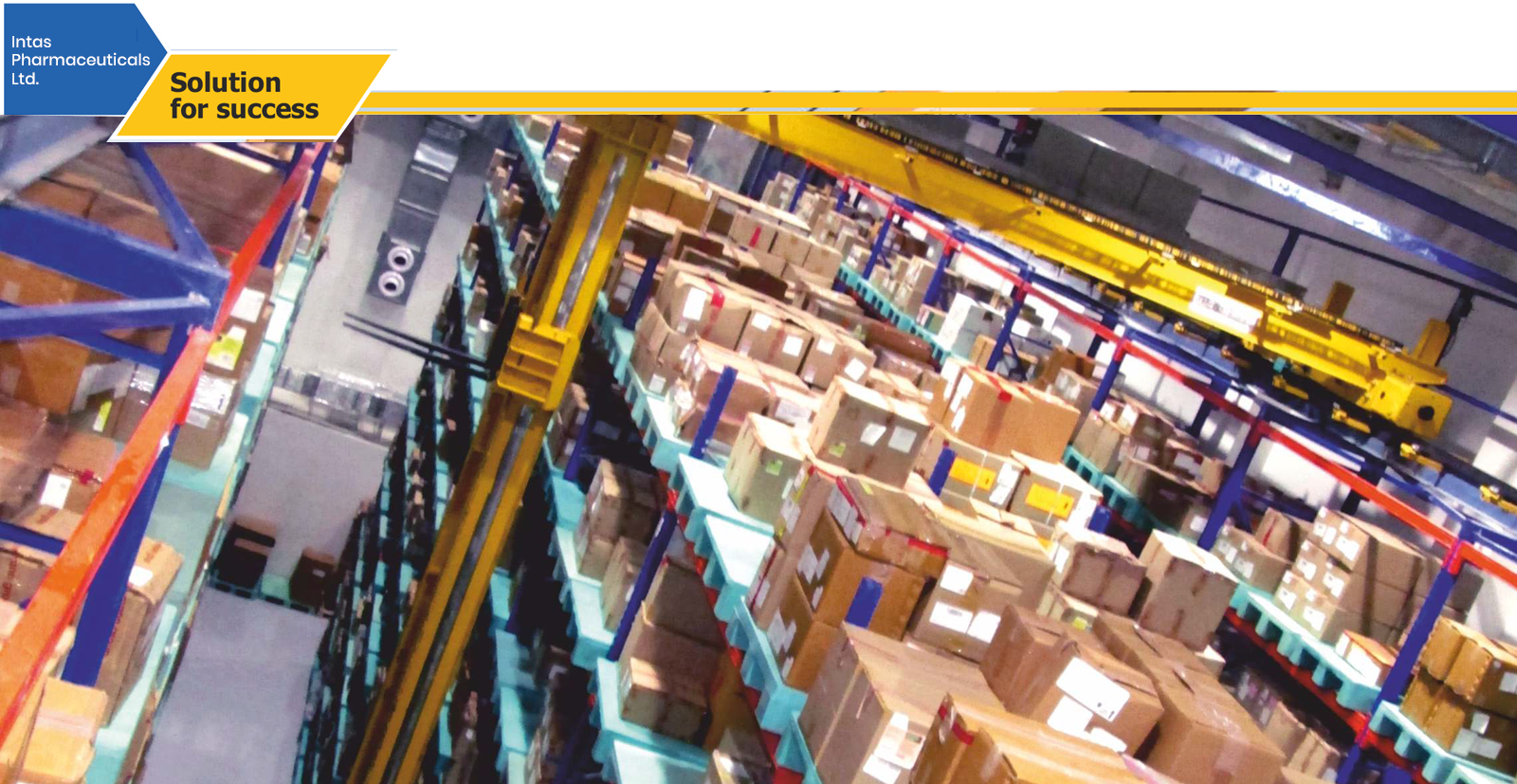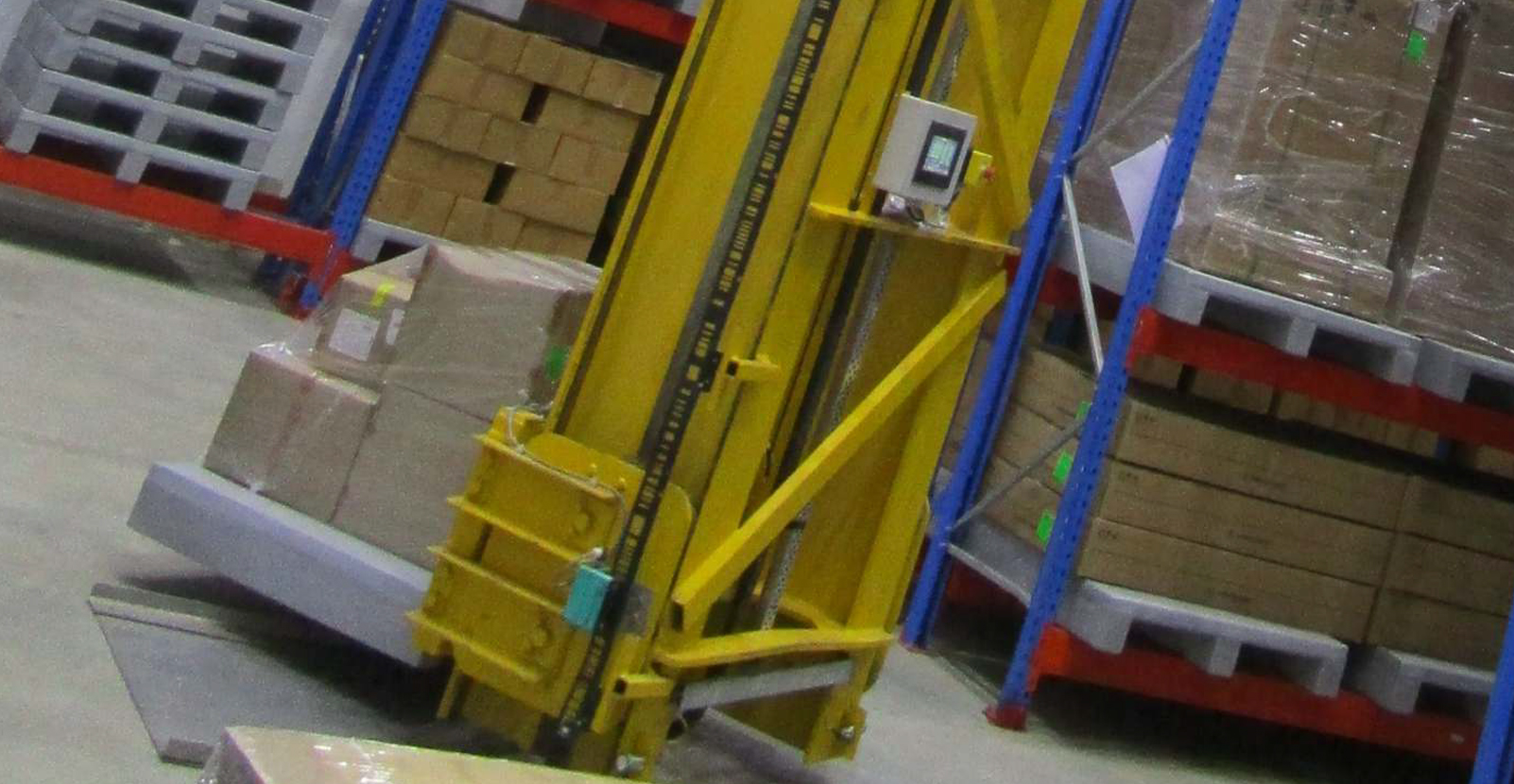Stacker cranes for optimal and efficient handling in the pharma sector
WE ARE YOUR SOLUTION
ElectroMech stacker cranes help
cure material handling malaise at Intas


About Intas Pharmaceuticals Ltd.
Intas is an Indian company that has made a great impact on the global pharmaceutical scene with its integrated pharmaceutical formulation development and manufacturing. As a rapidly growing pharmaceutical company, Intas experiences a steady movement of finished medicines and products from its plants to its warehouses. These products are then moved from the warehouses to the main distributors, and ultimately, to the retail outlets.
Intas has its main production plant at Chargodhar near Ahmedabad, India. Right across this plant is its warehouse which safely stores medicines and finished pharma products for further distribution. As a pharmaceutical company of repute, Intas stores its medicines in a palletised, safe, and hygienic manner. On an average, these pallets weigh about 500kg each. With space at a premium, and a growing need for storing larger number of finished medicines, Intas has resorted to the internationally accepted vertical storage system, where the medicines packed in boxes are stacked in pallets which are one atop the other. Intas needed material handling solutions for safe storage and efficient distribution of medicines from its warehouse to the distributors.
ElectroMech worked with Intas Pharmaceuticals for this project to whom we provided an optimal, efficient and cost-effective solution for its requirement.
Automated stacker crane system for faster retrieval of stored material, space saving, and real-time inventory management.

Handling challenges
Intas Pharmaceuticals uses Automated Storage and Retrieval System (ASRS) in several of its production plants and is happy with its capabilities. However, there were certain specific requirements at Chargodhar, which could also be addressed optimally through material handling solution from ElectroMech.
The first and foremost challenge was the space constraint between aisles. There was a limited space of only about 1800mm between two racks where the material handling equipment would be able to operate. This was compounded by the fact that there were three such storage rows each with vertical storage of pallets up to 5m height. The solution would then need to have the capability to stack pallets and access vertical racks efficiently.
Intas operates on a high volume and multiple shift basis where medicines are moved round-the-clock in three shifts. This mandated the material handling solutions to work efficiently on 24x7 basis with little or zero downtime. The material handling equipment would need to move pallets from the stacking racks to the trucks.
Another specification was for the high value medicines for life threatening diseases like cancer that are distributed in comparatively low volumes. These medicines need to be accessed on a per-packet basis as opposed to the per-pallet basis. This may not be viable with ASRS. Each time such a requirement arises, the ASRS would have to be shifted to the manual mode and the medicines would have to be retrieved by the operator. This could lead to considerable loss of efficiency and productivity. This meant that the optimal solution would need the capability to address requirements both, in manual and automated formats.
Another critical and determining factor was the investment costs. Intas specifically needed a more cost-effective and efficient solution which would help it control its investment costs while helping it to increase productivity. These stipulated ‘medicinespecific’ and ‘requirement-specific’ solutions necessitated a manual material handling solution instead of an automated one.
Solutions from ElectroMech
The ElectroMech technical team gathered in-depth information and studied the production and storage volumes and material movement schedules on a daily and monthly basis. The team then went on to identify certain areas where it was felt that our solutions would be better suited than an ASRS.
It was suggested that with increased vertical storage, Intas would be able to maximise its space utilisation and would be able to store more volumes of medicines in the same warehouse space. Our solutions would also enable efficient material movement on a perpallet or per-packet basis, as was required.
Based on its analysis, our team advised Intas about our stacker cranes which would be able to meet requirements in the most cost-efficient manner. The requirement would be optimally resolved by three stacker cranes having SWL of 0.5t each with the height of lift of 7m and a span of 14.3m each.
These stacker cranes would be able to load pallets over and above the rack height of 5m and would be able to easily operate within the 1800mm aisle space between racks. This would not only increase speed and efficiency, but would also be able to provide access to pallets to extract individual packets of medicines for distribution. Manual operations reduced dependency on availability of power for operations of automated systems.
Intas is satisfied with the solutions provided by ElectroMech and within a short span of time, we have gained three more orders for Intas’ warehousing units at different locations.
How Intas benefits from the ElectroMech solution
- Maximum space utilisation and increased vertical storage within the limited aisle space of 1800mm between racks
- Complete solution to stack, store, and move pallets on a regular basis from warehouse to trucks
- Safe and efficient handling of medicines
- Solution independent of power availability for round-the-clock operations
Challenges
- Capability to operate in manual as well as automatic mode
- System to operate in 1800mm aisle space of existing storage racks
- Cost-effective solution compared to ASRS
- Fail-safe system for 24x7 operation
Solution
- Three stacker cranes having SWL of 0.5t each, with height of lift of 7m and span of 14.3m each
- Ability of stacker cranes to operate efficiently in a narrow aisle space
- Increased vertical storage ability for maximum space utilisation
- Cost-effective and efficient option for switching between manual and automated operations
- Nearly zero downtime for round-the-clock operations in high volume and multiple shift operations
- Timely and effective maintenance and upkeep
